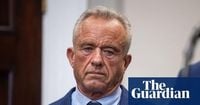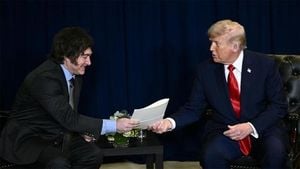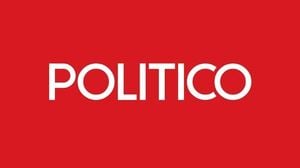At the United Nations General Assembly in New York on September 25, 2025, the United States threw a wrench into global efforts to combat non-communicable diseases (NCDs) by refusing to back a much-anticipated political declaration. The move, spearheaded by U.S. Health Secretary Robert F. Kennedy Jr., has sparked intense debate and shone a spotlight on both the politics and the public health challenges at the heart of the fight against diseases like cancer, diabetes, and heart disease.
Addressing the assembly, Kennedy delivered a striking rebuke of the declaration, stating, “We cannot accept language that pushes destructive gender ideology. Neither can we accept claims of a constitutional or international right to abortion. [The declaration] exceeds the UN’s proper role while ignoring the most pressing health issues, and that’s why the United States will reject it.” His comments, as reported by The Economic Times and The Guardian, echoed a broader U.S. government position that has, in recent years, become increasingly skeptical of international health bodies and their agendas.
Yet, the 15-page declaration—seen by journalists from AFP and other outlets—makes no mention of abortion rights or gender ideology, except in reference to the specific health challenges women face. Instead, it sets out ambitious new targets to accelerate the global response to NCDs and mental health, urging access to affordable medicines, integrating mental health with chronic disease care, and calling for tracking progress against heart disease, cancer, diabetes, and chronic respiratory diseases. According to the World Health Organization (WHO), these conditions account for 43 million deaths annually—an astonishing 75% of all deaths worldwide. Even more striking: 80% of these deaths are considered preventable.
The U.S. stance, then, has left many scratching their heads. Katie Dain, chief executive of the NCD Alliance, an international NGO, told The Guardian, “The unity we saw today proves that most governments are ready to take the baton on NCDs.” The declaration received overwhelming support from other UN member states and is expected to be formally adopted in the coming weeks, despite the U.S. objection. Dain’s optimism, however, is tempered by the knowledge that only 19 countries are currently on track to meet the UN’s goal of reducing premature mortality from NCDs by one-third by 2030.
One of the declaration’s most hotly debated omissions is the lack of strong language on taxing alcohol, tobacco, and sugary drinks—measures that public health experts say are crucial to reducing NCDs. Commitments to such levies appeared in earlier drafts but were ultimately dropped after what advocacy groups describe as intense lobbying from the food, beverage, and tobacco industries. Alison Cox, policy and advocacy director at the NCD Alliance, lamented to The Guardian, “All the agreement about investing in health protection is being lost to the interests of a few industries who are externalising the effects of their products onto economies.”
The absence of these measures is particularly troubling in light of recent global trends. By 2035, the number of people living with overweight or obesity is expected to hit 4 billion—a staggering figure. And for the first time in history, more children worldwide are obese than underweight, with the fastest rises occurring in low- and middle-income countries. Dr. Joan Matji, director of child nutrition and development at UNICEF, painted a stark picture at the World Obesity Forum in New York: “Everywhere children go—shops, restaurants, schools, sports events, while watching TV or scrolling social media—children are surrounded by ultra-processed foods that are cheap and aggressively marketed. We know UPFs are highly profitable, giving the food industry amazing power and influence.”
Mexico’s experience offers a window into both the challenges and opportunities of policy intervention. The country, which first introduced a sugar tax in 2014, now plans to increase the levy by 40%, generating $3.2 billion annually for a national health fund. One in three Mexican children are overweight or obese, and diabetes is the country’s second-leading cause of death, responsible for 100,000 deaths each year. Ramiro López Elizalde, Mexico’s vice-minister of health, didn’t mince words at the obesity forum: “Obesity is the silent epidemic of our time. While [drinks company] executives make decisions on golf courses, millions are connected to a dialysis machine. The defenders of the soda industry say [the soda tax] is only about revenue. They are wrong. We seek to reduce consumption. This is not just a health crisis but about social and environmental justice. The same industry that makes our children sick pollutes our rivers. Human life is not a market, it is a right we must defend.”
Meanwhile, the U.S. administration’s approach to health policy has grown even more contentious. Since taking office, Kennedy has imposed new restrictions on who can receive COVID-19 vaccines, cut off federal research grants for mRNA technology—credited by the WHO with saving millions of lives—and announced fresh research into debunked claims linking vaccines to autism. President Donald Trump, at the start of his second term, signed an order for the U.S. to withdraw from the WHO, citing dissatisfaction with its pandemic response. Just days before the UN vote, Trump advised pregnant women to avoid Tylenol due to unproven links to autism and called for sweeping changes to standard childhood vaccines. The WHO, for its part, responded bluntly: “Neither Tylenol nor vaccines have been shown to cause autism.”
Despite these controversies, Kennedy insisted in his speech that “the United States will walk away from the declaration, but we will never walk away from the world or our commitment to end chronic diseases.” Critics, however, point out that the U.S. withdrawal from the declaration—and potentially from the WHO itself—could undermine global cooperation at a time when NCDs and mental health crises are on the rise.
For many, the episode has become a microcosm of larger tensions over global governance, national sovereignty, and the influence of industry on public health. While most governments have signaled their readiness to tackle NCDs head-on, the U.S. position has exposed deep divisions—both within the country and between it and the rest of the world—about how best to address the complex web of factors driving the global epidemic of chronic disease.
As the world waits for the final vote on the declaration, one thing is clear: The battle over the future of global health policy is far from over, and the stakes—for individuals, communities, and entire nations—could hardly be higher.




